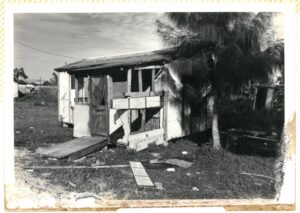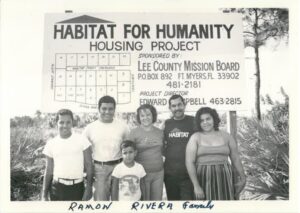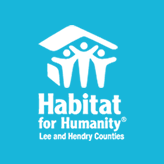Habitat for Humanity of Lee and Hendry Counties

A stark reminder of the need for change: This dilapidated shack in Harlem Heights, lacking electricity and running water, inspired the Lee County Mission Board to bring Habitat for Humanity to the area, transforming lives and communities. Photo circa 1980.
Habitat for Humanity of Lee County, Inc. began with the Lee County Mission Board. Supported by area places of worship, this non-profit group ministered to families in need in Lee County. The Mission Board focused its efforts on Harlem Heights, a run-down, neglected former migrant worker housing area in the southern part of Lee County (located between the present-day Gulf Harbor and HealthPark Medical Center).
In the late 1970s, the Mission Board was instrumental in securing a federal housing grant that resulted in the construction of some 40 homes in Harlem Heights. Funding ended in 1979, and no other federal grants were approved. Mission Board members Ed and Dorothy Campbell told the Board about the fledgling housing ministry called Habitat for Humanity, which Millard Fuller had founded in 1976 in Americus, Georgia. The Campbells had become familiar with the organization after visiting a building site in nearby Collier County. In 1979, the mission board invited Millard Fuller to Lee County to share his housing ministry idea. Millard flew to Fort Myers and told the mission board this:
“To start a Habitat affiliate, you need to get a piece of plywood, paint it white and write the words ‘Habitat for Humanity’ on it. Erect this sign in the ground outside the piece of property you plan to build the house on. Start digging a trench on this land as if you were to pour a foundation for the home—but don’t actually pour the concrete—just dig the trench. Once you have the trench dug, fill it all back in and dig it again, fill it back in and dig it again.”
The mission board thought, “What on earth are you talking about? We want to build homes, not dig in the dirt.” But the board did as Millard told them to.

The Rivera Family, proud partners and residents of the first Habitat for Humanity home in Lee County, which broke ground in February 1980.
A couple of weeks went by, and a man in a red pickup truck stopped and said, “I drive by here every day, and I see you doing the same thing day in and day out. What are you doing?” The group pointed to the sign and said, “Habitat for Humanity—we’re building homes for people who cannot afford a safe and decent place to live.” The man in the red pickup truck turned out to be a contractor and committed to funding the first two homes in Lee County, as well as providing all the labor for the construction.
The Mission Board appointed a Habitat for Humanity Administrative Committee and launched a fundraising campaign.
When the Lee County Commission donated land in Harlem Heights, the Administrative Committee invited Millard Fuller to speak at the groundbreaking ceremony. With Ed Campbell as project director, Habitat for Humanity of Lee County housed its first family in its new home by Christmas 1980.
In addition to Ed and Dorothy Campbell, other leaders of the Mission Board/Habitat for Humanity included Duera Mae Everett, a highly regarded activist and Harlem Heights resident, along with Reverend Ben Zaglaniczy and Ida Rodriguez.
Habitat for Humanity of Lee County was granted a charter in October 1982 and became one of Habitat for Humanity International’s first affiliates.
In 2011, the organization officially changed its name to reflect that it had served families in Hendry County for many years. The name was revised to Habitat for Humanity of Lee and Hendry Counties, Inc.





